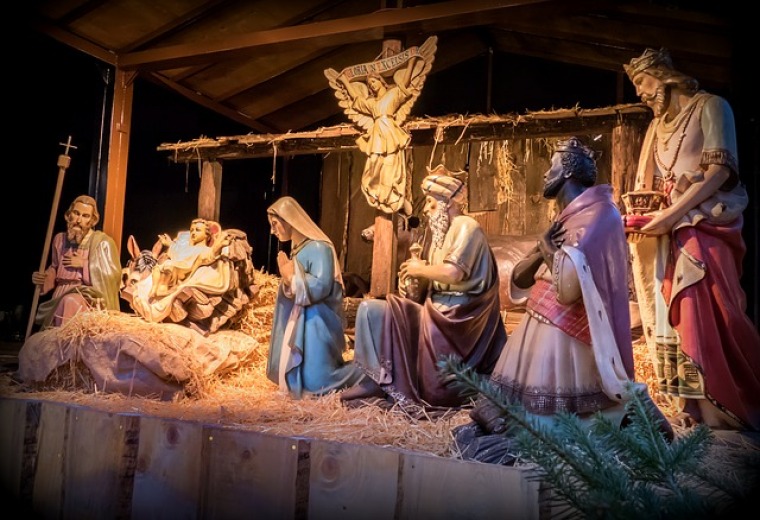Pew survey reveals significant drop in Americans who believe Biblical nativity story

A study conducted by the Pew Research Center has found that there has been a significant drop in the proportion of Americans who believe the Biblical account of the birth of Jesus Christ.
Pew has found that most U.S. adults believe that the religious aspects of Christmas are emphasized less now than in the past, with just over half saying they believe that the key aspects to the Bible's nativity story are true, such as Jesus being born to a virgin, laid in a manger, wise men bringing gifts to him after being guided by a star and angels appearing to shepherds.
The findings showed that 57 percent of Americans believe in all four elements of the Christmas story, compared to 65 percent in 2014. The sharp decline has been partly attributed to the rise in religious "nones" but there is also a significant drop in self-described Christians who say they do not believe the biblical Nativity account.
Among Christians, those who believe in all four elements of the Christmas story has dropped from 81 percent in 2014 to 76 percent today.
The decline is particularly noticeably among white mainline Protestants, 71 percent of whom say they believe the virgin birth, compared to 83 percent in 2014.
Meanwhile, the share of Catholics who believe that Jesus' birth was announced by an angel has dropped from 90 percent in 2014 to 82 percent this year.
Nine in 10 Americans say they will celebrate Christmas in some form this year, which is nearly identical to the share of U.S. adults who said the same in 2013. About eight in 10 plan to celebrate with family and friends while half said they plan to attend church on Christmas Day or Christmas Eve.
However, some of the ways Americans celebrate the holiday appear to be moving in a more secular direction, with 26 percent saying they believe no religious displays should be permitted on government property, up from 20 percent in the past three years.
The share of Americans who said that such displays should be allowed on government property unaccompanied by symbols of other faiths has also declined by seven points since 2014, according to Pew.
The study also found that fewer and fewer Americans are saying that it does not matter whether they are greeted with "Merry Christmas" or more secular phrases like "happy holidays."
More than half of Americans say they do not mind which greeting is used when they walk into a shop, while only a third say they prefer to be greeted "Merry Christmas." When Pew asked the same question in 2012, the polling organization found that the opinion was evenly split among those who say they did not mind which greeting is used and those who preferred "Merry Christmas."
 Christians don't have to affirm transgenderism, but they can’t express that view at work: tribunal
Christians don't have to affirm transgenderism, but they can’t express that view at work: tribunal Archaeology discovery: Medieval Christian prayer beads found on Holy Island
Archaeology discovery: Medieval Christian prayer beads found on Holy Island Presbyterian Church in America votes to leave National Association of Evangelicals
Presbyterian Church in America votes to leave National Association of Evangelicals Over 50 killed in 'vile and satanic' attack at Nigerian church on Pentecost Sunday
Over 50 killed in 'vile and satanic' attack at Nigerian church on Pentecost Sunday Ukrainian Orthodox Church severs ties with Moscow over Patriarch Kirill's support for Putin's war
Ukrainian Orthodox Church severs ties with Moscow over Patriarch Kirill's support for Putin's war Islamic State kills 20 Nigerian Christians as revenge for US airstrike
Islamic State kills 20 Nigerian Christians as revenge for US airstrike Man who served 33 years in prison for murder leads inmates to Christ
Man who served 33 years in prison for murder leads inmates to Christ


 Nigerian student beaten to death, body burned over ‘blasphemous’ WhatsApp message
Nigerian student beaten to death, body burned over ‘blasphemous’ WhatsApp message 'A new low': World reacts after Hong Kong arrests 90-year-old Cardinal Joseph Zen
'A new low': World reacts after Hong Kong arrests 90-year-old Cardinal Joseph Zen Iran sentences Christian man to 10 years in prison for hosting house church worship gathering
Iran sentences Christian man to 10 years in prison for hosting house church worship gathering French Guyana: Pastor shot dead, church set on fire after meeting delegation of Evangelicals
French Guyana: Pastor shot dead, church set on fire after meeting delegation of Evangelicals ‘Talking Jesus’ report finds only 6% of UK adults identify as practicing Christians
‘Talking Jesus’ report finds only 6% of UK adults identify as practicing Christians Mission Eurasia ministry center blown up in Ukraine, hundreds of Bibles destroyed: 'God will provide'
Mission Eurasia ministry center blown up in Ukraine, hundreds of Bibles destroyed: 'God will provide' Church holds service for first time after ISIS desecrated it 8 years ago
Church holds service for first time after ISIS desecrated it 8 years ago Burger King apologizes for 'offensive campaign' using Jesus' words at the Last Supper
Burger King apologizes for 'offensive campaign' using Jesus' words at the Last Supper Uganda: Muslims abduct teacher, burn him inside mosque for praying in Christ’s name
Uganda: Muslims abduct teacher, burn him inside mosque for praying in Christ’s name